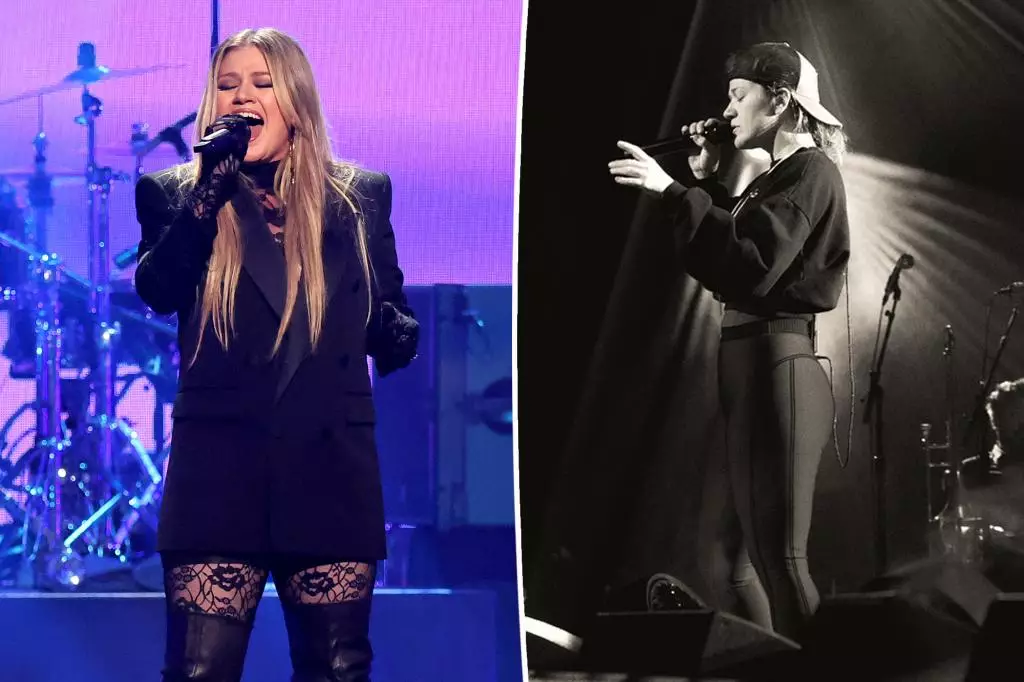In the glamorous world of entertainment, fans often idolize their favorite stars, envisioning them as entities capable of unwavering perfection. Yet, incidents like Kelly Clarkson’s sudden concert postponement reveal the stark reality that even the most celebrated artists are vulnerable to physical and mental strain. Clarkson’s abrupt cancellation, announced merely 90 minutes before her scheduled Las Vegas debut, exposes a critical flaw in the celebrity-fan dynamic: the unrealistic expectations placed on performers to always deliver without faltering, regardless of their well-being. While the public perceives such cancellations as a setback or disappointment, the deeper truth is that the relentless pressure to meet high artistic standards often leads artists into compromising their health, risking burnout or irreversible damage.
The veneer of effortless celebrity often masks a grueling reality. Clarkson’s candid admission that her voice and physical health necessitated rest speaks volumes about the toll that demanding schedules, constant rehearsals, and high-stakes performances exact on artists. The social media outcry, with fans calling for reimbursements or insurance, underscores a broader societal misconception—that fan investment should be financially rewarded regardless of circumstances. It’s an unfair expectation that overlooks the human side of performers, who are susceptible to illness, fatigue, and emotional exhaustion just like anyone else.
The Hermetic Bubble of Instant Gratification vs. Real Human Limits
In an age driven by immediacy, fans expect instant gratification—and this extends to their entertainment experiences. However, this obsession with perfection breeds impatience and disappointment when artists falter. Clarkson’s last-minute decision, justified by her need to rest and protect her vocal cords, highlights a crucial discord: the demand for flawless performances versus the natural limits of human endurance.
This scenario also sheds light on the flawed assumption that artists owe their audiences unyielding availability, regardless of their physical state. Clarkson’s heartfelt communication about her health indicates a mature understanding that artistry is not purely about entertainment—it’s a craft rooted in physical and mental well-being. The industry must reassess its priorities, placing the artist’s health at the forefront rather than perpetuating the myth that the show must always go on, at any cost.
Furthermore, the reaction from fans—some supportive, others frustrated—reflects the complex relationship modern audiences have with celebrities. While many commend Clarkson’s honesty and compassion for her own limits, others demand monetary compensation for their inconvenience. This dichotomy exemplifies the transactional mindset that pervades fan culture, where personal sacrifice is often overshadowed by entitlement.
The Hidden Costs: Emotional and Financial Strain on Artists and Fans
Behind the scenes, the toll of such cancellations extends beyond disappointment. Artists like Clarkson often face emotional distress, feeling guilt for letting down fans or concern over their own health deterioration. This internal conflict can exacerbate stress, creating a vicious cycle of overexertion that ultimately compromises their ability to perform at their best in future endeavors.
Meanwhile, fans who travel long distances and invest significant money face tangible financial repercussions. The outrage regarding potential reimbursements or insurance claims highlights the urgent need for the industry to implement robust contingency plans. Signing on for a high-profile residency, like Clarkson’s at Caesars Palace, involves substantial financial commitments—tickets, travel, accommodations—and when cancellations occur at the eleventh hour, these costs become personal losses rather than quick inconveniences.
The ongoing debate about how the industry compensates fans and protects performers reveals a fundamental imbalance. While revenue streams and ticket sales matter, the emotional and financial investments of fans deserve acknowledgment and safeguard through better policies and transparency. Clarkson’s case should serve as a catalyst for the industry to innovate in this regard, fostering a culture of mutual respect and shared responsibility.
The Larger Context: Personal Struggles, Career Pressures, and the Price of Success
Adding complexity to Clarkson’s situation are rumors concerning her personal hardships and the toll of her multi-faceted career. Balancing a successful singing career, a prominent talk show, and personal life is no small feat. The stress of maintaining relevance, the relentless pursuit of perfection, and the public scrutiny that accompanies fame generate an environment ripe for exhaustion and burnout.
Clarkson’s decision, while seemingly just about vocal health, may also be driven by deeper emotional fatigue stemming from personal struggles or the ever-present pressure to sustain a certain level of excellence. The music and entertainment industries often overlook the invisible weight that artists bear—expectations, self-imposed deadlines, and the fear of falling short. It’s a sobering reminder that behind the glitz lies a human who must navigate the same vulnerabilities as anyone else.
Ultimately, her choice to pause her residency underscores an urgent truth: the relentless pursuit of success should not come at the expense of one’s health. As fans and industry observers, recognizing this balance is vital. Genuine appreciation involves respecting the artist’s limits and understanding that their vitality is essential for long-term artistry—not just immediate gratification.
—
In examining Kelly Clarkson’s sudden show cancellation, it becomes clear that the entertainment industry must evolve. Fans should foster patience and empathy, understanding that health and well-being are paramount. Artists deserve our respect—not only for their talent but for their humanity. Only through a collective shift in perspective can we create an environment where artistry flourishes sustainably, and the true cost of fame is acknowledged and addressed.

Leave a Reply